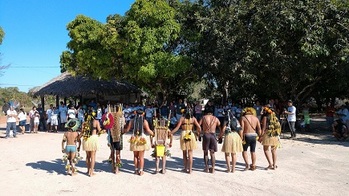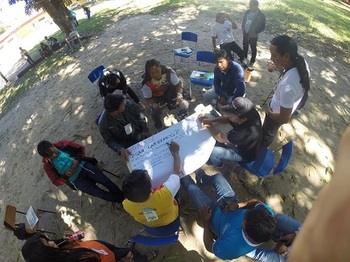REDD+ for Early Movers (REM)
Project description
Title: REDD+ for Early Movers (REM)
Commissioned by: German Federal Ministry for Economic Cooperation and Development (BMZ)
Financier: KfW development bank
Country: Brazil
Lead executing agency: The Secretariat for the Environment of the State of Mato Grosso (Sema/MT), the Secretariat for the Environment of the State of Acre (Sema/AC), the Institute of Climate Change and Environmental Services Regulation of the state of Acre (IMC/AC), and the Brazilian Ministry of the Environment (MMA)
Overall term: 2017 to 2019

Context
The states of Mato Grosso and Acre have made significant progress in reducing deforestation and, consequently, reducing CO2 emissions. Brazilian states’ initiatives, such as legal regulations related to REDD+ and sustainable strategies regarding public policies to fight deforestation and the valorisation of the standing forest; along with a series of prerequisites, have enabled the selection of these states to participate in the REDD+ for Early Movers (REM). This program awards pioneering REDD+ initiatives and is coordinated by the KFW development bank by means of payment-by-results contracts.
Acre is in the second phase of the program, and Mato Grosso is in its first phase, which consists of planning and implementation. GIZ provides these partners with focused technical support to meet the requirements to receive payments by results with respect to: safeguards, ombudsman systems, inclusive and effective benefit sharing, as well as participatory governance.
Objective
The states of Mato Grosso and Acre now act through participatory governance in REDD + systems, in the strategy of sharing effective and inclusive benefits. In addition to compliance with REDD + Safeguards as well as with other international standards. GIZ supports the improvement of scenarios in the states to meet the objectives above.
Approach
The REM Programme is implemented in two Brazilian states. In Mato Grosso, it is run jointly by the state government and the federal government through the Ministry of the Environment (MMA), with active participation of civil society. In Acre, it is run jointly by the state government, the state’s Institute of Climate Change and Environmental Services Regulation, and the federal government through MMA, also with active participation of civil society. As the program is being implemented in two other countries (Colombia and Ecuador), constant exchange of experiences is encouraged, and eventually the lessons learned will be disseminated nationally and internationally.

GIZ supports the Federation of Indigenous Peoples and Organizations of Mato Grosso (Fepoimt) and the Center for Life Institute (ICV) in the development of the Indigenous Territories in Mato Grosso Sub-programme, encourages participatory governance in decision-making and program implementation in both states; strengthens synergies between the states and the National REDD+ Committee (ConaREDD+), supports compliance with socio-environmental safeguards; supports deforestation monitoring in the states; supports the development of a REM/SisREDD+ socio-environmental risk management system; supports the strengthening of the ombudsman’s office for REM/REDD+; and encourages the effective inclusion of indigenous peoples and traditional peoples and communities in the implementation of the sub-programmes, based on the institutional strengthening of Fepoimt, the Superintendence of Indigenous Affairs (SAI), and the Secretariat of Family Agriculture of the state government of Mato Grosso.